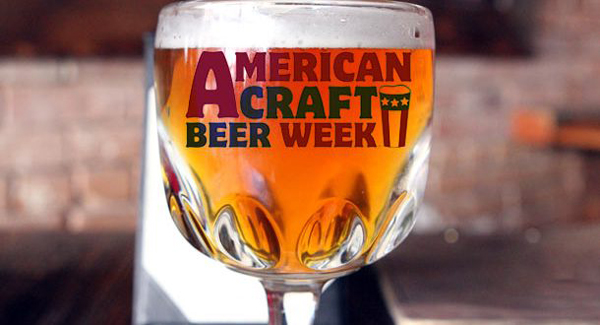当前位置: Language Tips> Columnist 专栏作家> 老外在中国
我爱喝青岛啤酒,尝试过雪花啤酒,也常喝北京产的冰镇燕京啤酒。但我最喜欢的还是桶装精酿啤酒,味道醇香诱人。有人预测,中国很快会迎来精酿啤酒的大繁荣。随着中国人越来越富裕,中产阶级的规模也越来越大,人们的口味也会发生变化。也许是时候重新思考那些有利于啤酒业巨头而削弱本土酿酒企业的政策了。

By Greg Fountain
In case this column doesn't make it immediately obvious, I might as well come right out and say it - I like beer.
如果这篇专栏还写得不够明显的话,我可以直截了当地说:我喜欢啤酒。
I'm partial to a Tsingtao, have experimented with Snow and can often be found supping from a cold can of Beijing's own Yanjing.
我爱喝青岛啤酒,尝试过雪花啤酒,也常喝北京产的冰镇燕京啤酒。
But what I enjoy most is a nice, rounded craft beer - something with depth, flavor and tantalizing taste.
但我最喜欢的还是桶装精酿啤酒,味道醇香诱人。
In Yorkshire, we call such beverages "hand pull", because they're most often served by way of a beer engine - a manually operated device for pumping up the lustrous liquid from a cask in the pub's cellar.
在约克郡,人们称这种酒为“手泵式啤酒”,原因是服务员在酒吧地窖取酒时,一般都是用一种手动操作的装置把这些色泽光亮的液体从桶里压出来。
Strictly speaking, this would more correctly be termed cask-conditioned beer or "real ale", which similar to the United States-style craft beer that China is more familiar with, owes much of its popularity to a backlash against mass-produced lagers that began in the 1970s.
严格来说,“手泵式啤酒”更应该叫做桶装啤酒或“散装鲜啤酒”,类似于中国人较为熟悉的美式精酿啤酒。精酿啤酒兴起于20世纪70年代,主要是因为当时人们开始反对工业化生产贮藏啤酒。
Between 1978 and 2012, the number of breweries in the US rose from 42 to more than 2,750, with virtually all of that growth attributable to craft brewers. Over the same period, the number of "real ale" brewers in the UK rose to more than 700, four times what it had been in 1971.
1978年至2012年期间,美国啤酒厂的数量从42家增加至2750多家,其中增加的几乎都是精酿酒厂。同一时期,英国“散装鲜啤酒”酿造商的数量增加至700多家,是1971年数量的四倍。
According to trade group the Brewers Association, the US craft beer market was worth $23.5 billion last year.
据美国啤酒酿造商协会统计,去年美国精酿啤酒销售额为235亿美元。
Some predict that a similar craft beer explosion will soon hit China, which is why I read a recent Fortune article on the subject with great interest.
有人预测,中国很快会迎来精酿啤酒的大繁荣,这也是为什么我会津津有味地读完了近期《财富》杂志上的一篇相关文章。
That piece, titled "China's New Craft-Beer Bully" outlined global beer behemoth Anheuser-Busch InBev's attempts to muscle in on the Chinese market at the expense of local players.
这篇名为《中国精酿啤酒的新“恶霸”》的文章概述了全球啤酒行业巨头百威英博啤酒集团是如何试图挤掉中国本土品牌,抢占中国市场的。
Apparently, the "heart of its strategy" is to "squash-or someday soon acquire-small breweries before they have a chance to capture market share". It does so by undercutting smaller operations, leveraging its size and ability to throw money around.
很明显,百威英博的战略核心是:百威英博通过压低小型酿酒商的利润空间,以其规模和实力四处投资,在小型酿酒商有机会获得市场份额之前,挤压其生存空间--或者将其吞并。
The reason why is simple - it doesn't want to miss the craft revolution, like it did in the US.
这么做的原因很简单——在错失美国的精酿革命之后,百威英博不想在中国重蹈覆辙。
By offering eye-watering sums of cash, big brewers like AB InBev can induce bars to remove all competing brands from their taps. Not all outlets will do so, but many - as the Fortune article points out - struggle to turn down the kind of money that's on offer.
像百威英博这样的大型酿酒商可以用丰厚的现金来诱惑酒吧,将在售的精酿啤酒全部转换为该公司旗下品牌。《财富》的这篇文章指出,虽然有的经销店不买账,但还是有很多经不起这种诱惑。
China's current regulatory environment also favors these big foreign companies - in the US, brewers can't monopolize the beer a bar offers or control distributors, but there are no such restrictions here.
中国目前薄弱的监管环境也有利于这些大型外国公司。在美国,酿酒商不能垄断酒吧销售的啤酒或控制经销商,但在中国没有这样的限制。
Rules around product safety, meanwhile, prevent many local craft brewers from running in-China bottling operations, which again puts them at a disadvantage.
与此同时,中国监管法规对啤酒饮用安全的要求让许多本土精酿制造商无法开展瓶装啤酒业务,进一步让他们处于劣势。
At present, craft beer only accounts for a tiny fraction of China's estimated $80 billion-per-year beer market.
中国当前啤酒市场市值约为每年800亿美元,而精酿啤酒只占了其中一小部分。
But as the country gets ever wealthier and the size of its middle class increases, tastes will change. Perhaps it's high time to rethink policies that favor the big beer bullies over homegrown entrepreneurs?
但是,中国人正越来越富裕,中产阶级的规模也越来越大,人们的口味也会发生变化。也许是时候重新思考那些有利于啤酒业巨头而削弱本土酿酒企业的政策了。
英文来源:“CHINA DAILY”微信公众号
翻译:刘晨菲
编审:丹妮 董静
音频编辑:焦洁
更多内容请关注“CHINA DAILY”微信公众号:

Broadcaster

Greg Fountain is a copy editor and occasional presenter for China Daily. Before moving to Beijing in January, 2016 he worked for newspapers in the Middle East and UK. He has an M.A in Print Journalism from the University of Sheffield, a B.A in English and History from the University of Reading.
上一篇 : 老外在中国:我的面子碎一地
下一篇 : 老外在中国:你听过快乐宝宝歌吗?
关注和订阅

电话:8610-84883645
传真:8610-84883500
Email: languagetips@chinadaily.com.cn